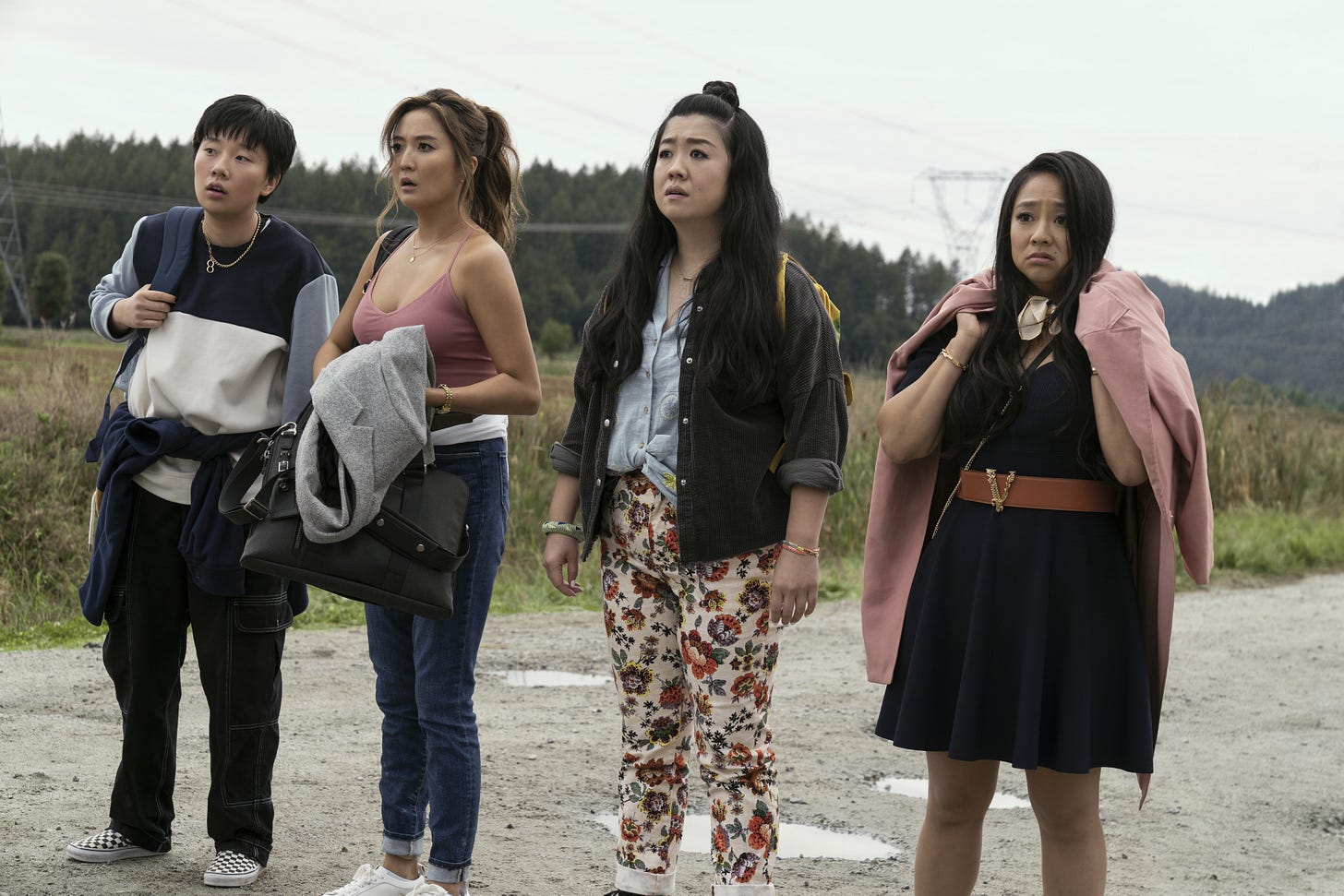*Joy Ride* Isn't Sure Where It's Going
The raunch com and the serious drama don't quite work together.
Joy Ride is two decent films haphazardly smooshed together. The first is a cartoonish raunch comedy. The second is a painful story about the trauma and dislocation of international adoption. You could argue that their uneasy juxtaposition matches or mirrors the mismatched friendship that is the ostensible center of both. Ultimately, though, Adele Lim, in her directorial debut, can’t quite make all the pieces fit.
The cartoonish raunch comedy features Audrey (Ashley Park) a high-powered lawyer, and her childhood friend Lolo (Sherry Cola), an artist who makes R-rated knick knacks. Audrey, who is the adopted child of a white family, needs to go to China to close a major deal—she brings Lolo along to translate. They travel with Lolo’s K-pop obsessed cousin Deadeye (Sabrina Wu), and meet up with Kat (Stephanie Hsu), Audrey’s former college roommate who is now a Chinese star actress..
The four have a lot of adventures, involving sex, drugs, rock and roll, and a lot more sex. Along the way they bond and then fall out and then bond again. It’s predictable in its zany unpredictability. She’s got a devil tattoo on her vagina! She threw up at an inopportune time! It’s fun, and the gendered reversal where the women get to have sexual desire and inappropriate sexual adventures is welcome. It’s just not especially ambitious.
And then there’s the other film. (Some SPOILERS ahead.)
Lolo and the improbable plot bully and cajole Audrey into trying to find her birth mother in China. She eventually discovers that her mom is not Chinese but Korean. She’s been mistaken about her ethnic identity for her entire life. That’s disorienting enough—but then she travels to Korea, and discovers her mother is dead.
This narrative is not a cartoon at all, and it makes the rest of the movie fade into inconsequence around it. Lolo’s goofy big loving Chinese family, who has taken Audrey in, brutally rejects her when they discover she’s Korean, echoing and amplifying the way that Lolo and her family always low-key told Audrey she was too white, rather than really Chinese or Asian. Audrey’s dislocation and self-hatred double nad multiply; she can’t speak Chinese, she can’t speak Korean, she doesn’t know who she is, she doesn’t know who her mother is.
There’s a real core of pain and resentment and betrayal there, which the rest of the film can’t exactly handle or address. Just for starters, if the movie is about Audrey’s sense of self and effort to belong and not belong, it seems like her adoptive parents should play a bigger role, rather than just being a half-hearted punch line. Did they know she was Korean? Why were they adopting from China? How did they try to address their daughter’s heritage? Did they have racist ideas about China and Asia that contributed to Audrey’s self-loathing? If Audrey’s identity crisis is the story, then it seems like the film should take a few moments off from the sex jokes to address these questions.
Audrey’s relationship with Lolo is supposed to fill the emotional gaps here. But it can’t really stand up to the adoption story. Again, Lolo pushes Audrey to seek out her birth mother, despite Audrey putting up considerable resistance. In the cartoon, good time, sex joke movie, this violation of boundaries just figures as another bit of whacky fun.
But if the adoption storyline has weight, then Lolo is demanding something of her friend that she doesn’t really have a right to demand; Lolo doesn’t know what trauma Audrey might uncover, and it’s not up to her to decide what Audrey wants to or does not want to know about her past.
Yet Lim and the film take Lolo’s side. Audrey is supposed to be grateful to Lolo for forcing her to investigate her past, and when she is resentful, she’s accused of being self-centered. But the decision to find a birth mother should be Audrey’s decision; it’s about her self. Why is it okay for Lolo to take that into her hands?
Of course everything works out in the end; that’s the kind of movie it is. The friends are all reconciled; Audrey admits that Lolo knows her better than she knows herself. As a raunch comedy finale, it makes sense. As a conclusion to the story of adoption, identity, trauma, and grief, it feels glib and unconvincing. Joy Ride hoots and honks its way to a place a lot more serious than that title suggests. But once it gets there, it doesn’t quite know where to steer.
This blog is entirely reader supported. If you find this piece valuable, consider becoming a subscriber, either here or on Patreon.



I agree with everything you wrote and yet, I enjoyed the film more than I expected to (I'm not generally a fan of raunch-coms), and it helped that the actors and directors felt equally committed to both parts of the movie (even if they didn't completely mesh).
On an unrelated note, this seems like a story you would appreciate: https://www.lawyersgunsmoneyblog.com/2023/12/sex-and-work-among-contemporary-higher-education-administrators